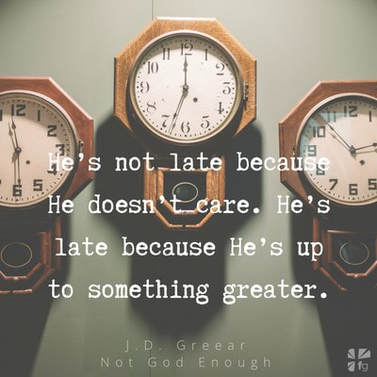
I know that we’ve been taught all our lives, by well meaning people, that He was always there He promised to never leave or forsake you; He promised to give you “peace that passes all understanding”. We’ve probably said those things to people when trying to provide some comfort during a tragic and tying time. Because I’ve asked those questions myself I stop using them when anybody asked me where God was during a tragedy.
J.D. Greear, in his book Not God Enough, says that God is never late after all. While we are looking and waiting God is actually going through with us.
He Wasn't Late After All
excerpted from Not God Enough by J.D. Greear,
Where were you?
It’s a question we’ve all asked of somebody. Their absence or tardiness left us feeling abandoned, helpless, confused, and angry. If the stakes were high, we wondered if that person actually cared about us at all. Those moments when someone I depended on let me down have left me feeling helpless. When friends forget to call. When a trusted colleague doesn’t deliver. When a teammate doesn’t show up.
When the one who fails to show up as expected is God, it does more than disappoint. It can knock your faith off the rails.
“Lord, if You had been here…”
Mary and Martha felt this way about Jesus when their brother Lazarus got sick and died. Jesus, their friend, was not far away, and they had sent an urgent message for Him to come straight away.
So when he heard that Lazarus was sick, He stayed where He was two more days. — John 11:6
They waited. And waited. And Lazarus died. Then Jesus showed up. He offered no excuse.
Why hadn’t He come? Didn’t He love them? They thought He did. Everyone referred to Lazarus as the one Jesus loved (John 11:3). Did He not care after all?
Haven’t you felt this way? These are the questions that almost every Christ-follower asks as they pass through a dark valley: Where are You, God? Why haven’t You come? If You had been here... I wouldn’t have failed. My parents wouldn’t have gotten divorced. I wouldn’t have gotten so hurt. My wife wouldn’t have died.
Jesus’s tardiness in coming to Lazarus was not due to a lack of care. As Jesus would explain, God had orchestrated this situation for a greater purpose — to reveal His glory through His control and ultimate victory over all things (John 11:4).
I’ll go ahead and give you the punchline: Jesus raises Lazarus from the dead. But along the way, Jesus teaches us what faith in a really big and sometimes confusing God looks like.
Jesus was doing three things in Mary’s and Martha’s pain, and they are what He’s doing in your pain as well.
He’s Weeping
When Jesus hears firsthand from Mary that Lazarus had died, He weeps (John 11:35). Jesus’s tears have always struck me as a little strange. Didn’t He know He was about to raise Lazarus from the dead? If you know that in less than ten minutes a loved one will be alive, why cry? Instead, why not say to Mary and Martha, “No, no! You don’t need to cry! I’m about to fix everything!”
I am a big college basketball fan, and sometimes games I want to watch happen during our services, so I record them to watch later. Invariably, someone spoils the outcome for me before I get home. If I find out that my team has won, I’m still excited to watch the game because even when something bad happens, I can say, “Who cares? In the end we win.” The bad calls, which normally drive me insane, don’t bother me that much. So why would Jesus weep knowing that in just a few minutes He was about to fix everything? It makes no sense.
But then I had kids, and I realized what it’s like to see someone you really love go through pain, even when you know the pain is temporary.
When your heart is closely knit together with someone else’s, their pain causes you pain.
It’s true that one day God will wipe away every tear and make every sad thing come untrue. To God, that moment seems like it is only seconds away (2 Pet 3:8)! Even so, when we are in pain now, He feels it. He has united His heart with ours. So when our heart is broken, His is too. When we weep, He weeps.
I know that Jesus will one day raise the dead, and I know He will take the worst situations and use them for His glory and my good. But when I’m hurting, maybe the most comforting truth of all is knowing that Jesus weeps with me.
He’s not late because He doesn’t care. He’s late because He’s up to something greater.
 Photo by Cristian Newman on Unsplash
Photo by Cristian Newman on Unsplash
When Jesus first heard about Lazarus’s sickness, He emphatically declared that this bout of death would not have the final word.
“But when Jesus heard it He said,
This illness does not lead to death. — John 11:4 ESV
But Lazarus did die! Jesus was looking past Lazarus’s death to his resurrection. This sickness did not lead to death; it led through death to a resurrection. Death was just a brief stop along the way.
When Martha, Lazarus’s other sister, told Jesus about her brother’s death, Jesus responded by saying,
Your brother will rise again. — John 11:23
To be frank, Jesus’s words here seem a little bit insensitive. If I were mentoring a pastor on how to do hospital visits, and this was the first thing he said to the weeping family after someone died, I’d tell him to work on his bedside manner. Imagine a funeral of a wife who tragically lost her husband. You wouldn’t slap her on the back and say, “What are you crying for? Haven’t you read the Left Behind books? It’s called the rapture, sister. Have some faith.”
Jesus wasn’t just offering her a theology lesson about the future. He was attempting to change her perspective on the present. We are to live in present awareness of eternal life. Martha didn’t see that at first, so she responded with a good Sunday school answer, saying,
I know that he will rise again in the resurrection on the last day. — John 11:24
She knew her theology.
Jesus says, But I’m talking about more than resurrection on the last day . . .
I am the resurrection and the life. Whoever believes in me, though he die, yet shall he live, and everyone who lives and believes in me shall never die. Do you believe this? — John 11:25–26
I am the resurrection and the life right now. In other words, I’m already turning the power of death around, using its powers of destruction to glorify My name and heal you. In Me, even when you die, you don’t really die.
To her credit, Martha believes. I suspect that many people in the church today don’t. We still act like our “illness” terminates in death. What scares us about death is that it feels like permanent loss. Someone we loved is gone forever. But Jesus took all these permanent, bitter parts of death into Himself so that none of it remains for us. As Paul explained, Jesus takes away death’s sting (1 Corinthians 15:55).
Jesus took the sting of death into His hands so that in Him we have nothing more to fear. Death, the mighty enemy, has been reduced to a temporary, inconvenient nuisance.
As Jesus walked up to Lazarus’s grave, the apostle John tells us He was “deeply moved” (John 11:38), a Greek phrase indicating not just sadness, but anger — the kind of anger you might feel at someone who has hurt or threatened someone you love. Some scholars say you can translate that word “snorted,” like a bull about to charge into battle. And then, like a fighter, Jesus yells out in a loud voice, “Lazarus, come out!” (John 11:43).
Lazarus, who had now been dead for four days, comes staggering out of the grave. By the way, “four days” was significant to Jews because they believed that a person’s spirit hovered above their dead body for three days to see if some miracle might rejoin the soul to the body. By the fourth day Jews believed the spirit had given up hope and gone on to Heaven. Death at four days was considered irreversible.
Not for Jesus. In Him death was finished, and after His resurrection there remains no power that can ever threaten His people. That’s because in dying for His people He took death’s terrible sting.
 Photo by Stephanie Klepacki on Unsplash
Photo by Stephanie Klepacki on Unsplash
Jesus told His disciples that the biggest objective He was pursuing in this encounter was God’s glory.
Through every episode of our pain God is writing a story for His glory. Like Mary and Martha, we sometimes can’t see where that story is going, how our pain fits into it, or why Jesus seems to arrive too late to help us. But because of stories like this one, we can rest assured that He is always working.
I’ve heard God’s work in our lives compared to the weaving of a tapestry. On one side you see a beautiful, intricate work of art. But if you lift the corner and look on the backside, you find an erratic and chaotic mess of strands. If all you could see were the backside of a tapestry as it was being woven, you would conclude that nothing beautiful was taking shape. When you flip it and look at it from the front, however, you see that every strand finds its perfect place according to the plan of the artist. One day, God will “flip over” history, and we will see that every strand of our lives was part of a picture God wove together for His glory.
Part of that beauty is something He is weaving into us. Through suffering we come to know Him better. He breaks up our confidence in ourselves. We develop compassion for others. We understand how much better God is than all earthly gifts, how He alone has power over death, and how He is faithful to sustain us even in pain. Through our pain, we experience parts of God we may not otherwise know! These are not easy or cheap lessons. They are costly and often brutal. But they are beautiful.
In 1 Corinthians, Paul says that one day “death will be swallowed up in victory.” When you swallow something, it becomes part of you. Paul doesn’t say that the memory of death will simply vanish. It becomes part of us, making us better for having gone through it. Death itself contributes to God’s beautiful picture.
Excerpted with permission from Not God Enough by J. D. Greear, copyright J. D. Greear.

 RSS Feed
RSS Feed